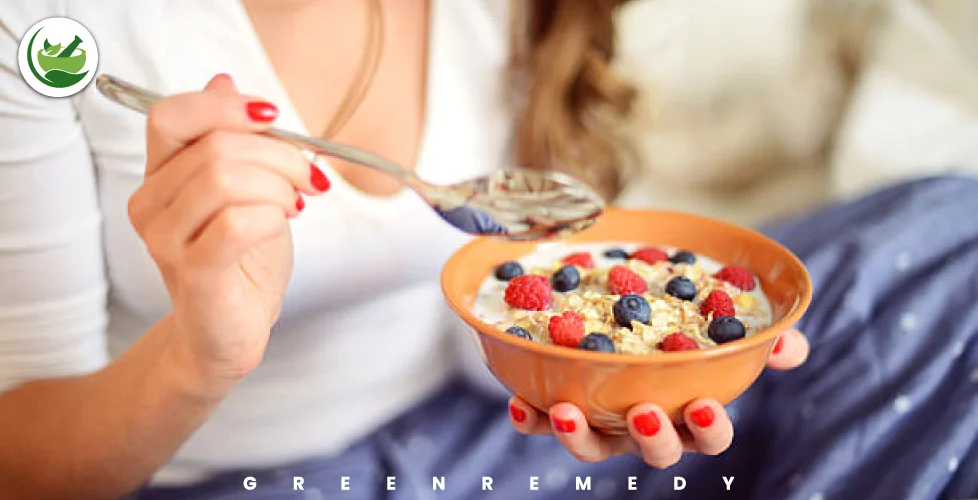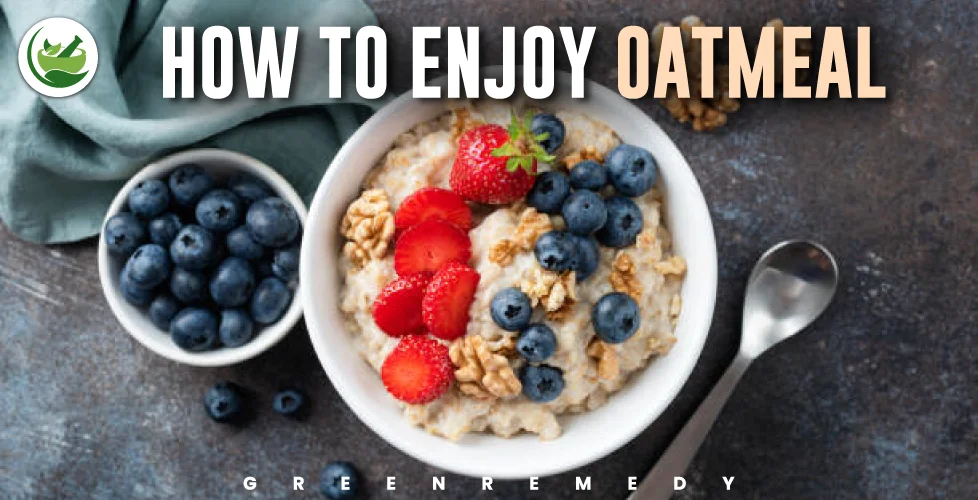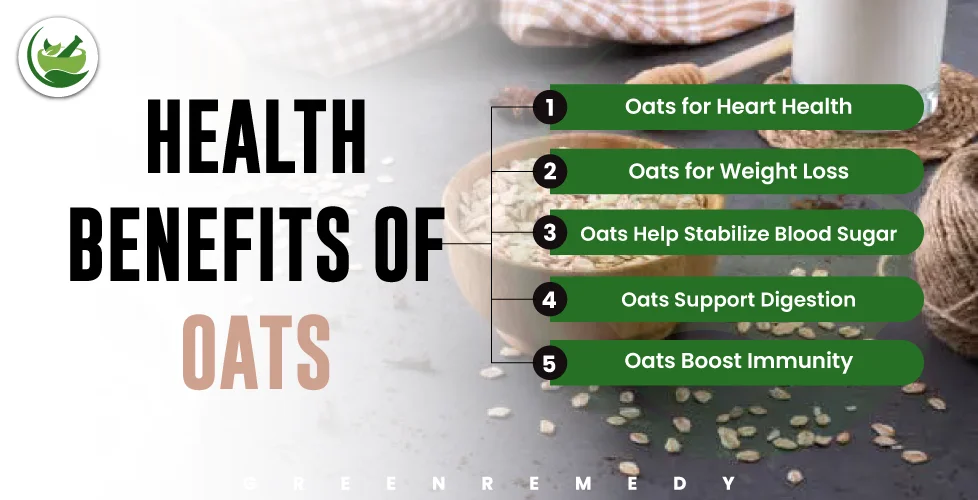
When it comes to fueling your body with real goodness, nothing beats the power of oats. Packed with protein, fiber, and essential vitamins, Oats Nutrition is the secret to better energy, improved digestion, and long-lasting fullness. From supporting heart health to aiding in weight loss nutrition, oats are a proven superfood for every lifestyle.
With their rich nutritional value, perfect balance of oats calories and protein, and the benefits of soluble fiber in oats, they’re more than just a breakfast choice—they’re a daily health booster.
👉 Start your journey to better health today—add a bowl of oats to your routine and experience the true health benefits of oats.
What Are Oats and Oatmeal?
Oats are a type of whole grain (Avena sativa) enjoyed in many forms. The least processed are oat groats, which take the longest to cook. To save time, most people choose steel-cut, rolled, or instant oats, with instant being the quickest but softest in texture.
When cooked with water or milk, oats become oatmeal, also known as porridge. Beyond breakfast bowls, oats are used in cookies, granola bars, muffins, and other baked goods.
Read More: How to Make the Perfect Oats Porridge Recipe with Fruits
How to Make Oatmeal
Simple, delicious, and versatile ways to prepare oatmeal at home.
1. Classic Stovetop Oatmeal
- 1 cup rolled oats
- 2 cups water or milk (or a mix)
- Pinch of salt
Steps:
- Bring water or milk to a boil.
- Stir in oats and reduce heat.
- Cook for 5–7 minutes, stirring occasionally, until creamy.
- Add toppings like fruits, nuts, or honey.
2. Microwave Oatmeal (Quick & Easy)
- ½ cup rolled oats
- 1 cup water or milk
Steps:
- Mix oats and liquid in a microwave-safe bowl.
- Microwave for 2–3 minutes, stirring halfway.
- Let it sit for 1 minute to thicken.
- Top with bananas, cinnamon, or seeds.
3. Overnight Oats (No Cooking Needed)
- ½ cup rolled oats
- ½ cup milk or yogurt
- Chia seeds (optional)
- Sweetener or fruit
Steps:
- Combine oats, milk, and add-ins in a jar.
- Refrigerate overnight (at least 6 hours).
- Stir in fresh fruit or nuts before serving.
4. Savory Oatmeal (Hearty Option)
- Cook oats as in the stovetop method.
- Skip sweet toppings and add soy sauce, eggs, avocado, or sautéed veggies.
Pro tip: Use rolled oats for creaminess, steel-cut oats for a chewy texture, and instant oats if you’re short on time.
The Power of Fiber in Oats
The fiber in oats is what makes them truly special. Oats are one of the best natural sources of beta-glucan, a type of soluble fiber with proven health benefits.
What Beta-Glucan Does for Your Body:
- Reduces bad cholesterol (LDL) while maintaining good cholesterol (HDL).
- Supports digestive health by promoting healthy gut bacteria.
- Helps regulate blood sugar levels.
- Keeps you feeling full longer, reducing unnecessary snacking.
Just one serving of oatmeal in the morning can keep hunger at bay for hours, making oats one of the best foods for appetite control.
Nutritional Value of Oats (Per 100g)
Before we dive into the health benefits, let’s break down the nutritional value of oats. Understanding the nutrients inside this humble grain will help you see why it deserves its reputation as a powerhouse food.
| Nutrient | Amount / Description |
| Calories | ~389 kcal |
| Carbohydrates | ~66 g |
| Protein | ~17 g |
| Fat | ~7 g (mostly healthy fats) |
| Fiber | ~10 g |
| Key Minerals | Iron, Magnesium, Zinc, Phosphorus, Manganese |
| Vitamins | B1 (Thiamine), B5, Folate |
This balance of oats calories and protein, along with their high fiber in oats, makes them unique compared to many other grains. Oats are rich in slow-digesting carbohydrates, meaning they provide long-lasting energy without sudden spikes in blood sugar.
How to Enjoy Oatmeal

While oatmeal is a breakfast favorite, it can be used in many other meals and snacks. Here are some tasty and healthy ideas:
- Use oats instead of breadcrumbs in burgers or meatloaf.
- Make a vegetarian lentil loaf with oats for a filling meatless option.
- Bake oatmeal cookies as a better alternative to sugary desserts.
- Try savory oatmeal with soy sauce and green onions.
- Prepare overnight oats for a ready-to-eat snack anytime.
- Whip up homemade granola with oats, dried fruit, and nuts.
- Mix oats into yogurt with fresh fruit for a quick, nutritious bite.
- Make fruit crisps by topping baked fruit with oats, flour, and a little sugar.
- Blend oats into pancake batter for extra flavor and fiber.
Read More: Morning Game-Changer: A Comprehensive Oats Overnight Review for Busy Lifestyles
Plant-Based Compounds in Oats
Whole oats contain a variety of natural antioxidants that contribute to their health-promoting properties. Some of the key compounds are:
- Avenanthramides: Unique to oats, these powerful antioxidants may help reduce arterial inflammation and support healthy blood pressure.
- Ferulic Acid: A common polyphenol found in oats and many grains, known for its strong antioxidant effects.
- Phytic Acid: Concentrated in the oat bran, this compound can limit the absorption of certain minerals like iron and zinc.
Health Benefits of Oats

Now let’s explore the proven health benefits of oats that make them a must-have in your daily diet.
1. Oats for Heart Health
Oats are well-known for their positive effects on cardiovascular health. The beta-glucan fiber helps lower LDL cholesterol, reducing the risk of heart disease. In fact, many doctors recommend eating oats regularly as part of a heart-friendly diet.
2. Oats for Weight Loss Nutrition
Because oats are rich in fiber and protein, they promote a feeling of fullness. This satiety effect naturally reduces calorie intake, making oats an excellent food for weight management. A bowl of oatmeal in the morning helps prevent overeating later in the day.
3. Oats Help Stabilize Blood Sugar
The slow-digesting carbs in oats prevent spikes in blood sugar, making them a smart choice for people with diabetes or those trying to maintain steady energy levels.
4. Oats Support Digestion
The fiber in oats improves bowel movements and prevents constipation. Regular oatmeal eaters often report better digestion and gut health.
5. Oats Boost Immunity
Beta-glucan fiber doesn’t just help with digestion; it also supports the immune system by enhancing the activity of white blood cells. This makes oats an underrated immunity booster.
6. Oats Provide Essential Micronutrients
From magnesium (important for muscle and nerve function) to iron (critical for healthy blood), oats are packed with vital minerals that many people lack in their daily diet.
Oats Carbs and Protein: Perfect Balance for Energy
The combination of oats carbs and protein makes oatmeal an ideal pre- or post-workout meal. The complex carbs provide slow-release energy, while the protein supports muscle recovery. Unlike sugary cereals that give you a quick burst of energy followed by a crash, oats keep you fueled for hours.
Oats Nutrition for Weight Management
If your goal is to shed extra pounds, oats can be your best friend. Here’s why:
- Low in calories but high in nutrients.
- Fiber promotes satiety, reducing cravings.
- Balanced oats nutrition for weight loss supports a healthy metabolism.
- Easy to prepare in different ways (overnight oats, smoothies, savory oats).
By swapping out refined carbs (like white bread or pastries) with a bowl of oats, you can cut calories while still feeling satisfied.
How to Add Oats to Your Diet
One of the best things about oats is their versatility. You can enjoy them in countless ways:
- Classic Oatmeal: Cook with water or milk, and top with fruits, nuts, or seeds.
- Overnight Oats: Soak oats overnight with yogurt or almond milk for a ready-to-go breakfast.
- Oat Smoothies: Blend oats with bananas, berries, and protein powder.
- Savory Oats: Prepare oats with vegetables and spices for a healthy lunch option.
- Baking with Oats: Add oats to cookies, bread, or muffins for extra nutrition.
Oats Nutrition: A Smart Choice for Everyone
From children to seniors, athletes to busy professionals, oats offer health benefits for every lifestyle. They’re affordable, widely available, and easy to prepare—making them one of the most practical superfoods in the world.
Read More: Exploring the World of Chocolate Overnight Oats: Tips, Tricks, and Recipes
Possible Drawbacks of Oats
For most people, oats are safe and easy to digest, but there are a few exceptions.
Some individuals are sensitive to avenin, a protein in oats that can cause reactions similar to gluten intolerance. In such cases, oats should be avoided.
Another concern is cross-contamination. During processing, oats may come into contact with wheat or other gluten-containing grains. This makes them unsuitable for people with celiac disease or wheat allergies unless they’re labeled certified gluten-free oats.
FAQs
Quick answers to the most common questions about oats and oatmeal.
1. Is it good to eat oats daily?
Yes, eating oats daily is healthy as they provide fiber, protein, and essential nutrients that support heart, gut, and overall health.
2. Which is healthier, chia or oats?
Both are nutrient-rich; chia seeds are higher in omega-3s, while oats offer more protein and soluble fiber for sustained energy.
3. What are the pros and cons of oats?
Oats are affordable, filling, and heart-healthy, but may cause bloating, contain phytic acid, or risk gluten cross-contamination.
4. Does oatmeal raise blood sugar?
Oatmeal has a low glycemic index and usually stabilizes blood sugar, though instant oats can cause quicker spikes.
5. What are the healthiest oats to eat?
Steel-cut and rolled oats are the healthiest as they’re minimally processed, rich in fiber, and retain more nutrients.
Final Thoughts
To sum it up, oats are more than just a breakfast option—they’re a nutrient-dense, heart-healthy, and weight-loss-friendly food that belongs in every household. With their excellent nutritional value of oats, rich fiber in oats, and balanced oats carbs and protein, they support long-term health in multiple ways.
👉 Ready to experience the proven benefits of oats? Make them part of your daily routine and feel the difference in your health and energy.






